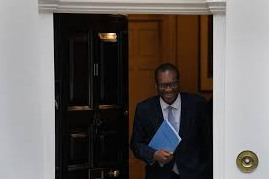
International Monetary Fund Urges Chancellor Kwasi Kwarteng to Reassess Tax Plan Amid Economic Uncertainty
The International Monetary Fund (IMF) has issued a strong critique of the UK government’s tax policy, warning that it could exacerbate inequality. The IMF’s statement follows Chancellor Kwasi Kwarteng’s controversial mini-budget, which included tax cuts and higher borrowing. These measures caused market instability, with sterling dropping to a historic low against the dollar, prompting global scrutiny.
The IMF stated that it is closely monitoring developments and urged the Chancellor to reconsider the tax proposals, particularly the controversial decision to scrap the 45p income tax rate for individuals earning over £150,000. The IMF expressed concern that the policy, as it stands, would likely increase social inequality.
In the face of mounting criticism, the Bank of England has indicated it may need to raise interest rates in an effort to stabilise the pound and curb inflation. Despite this, Kwarteng remains optimistic about the long-term benefits of his tax-cutting approach, maintaining that it will stimulate economic growth and reduce the national debt.
The IMF, however, was less assured. While acknowledging the government’s aim to support households and businesses through the energy crisis and promote growth, the IMF warned that large, untargeted fiscal packages at this stage could undermine monetary policy efforts, especially when inflation is already high. “The nature of the UK’s tax measures will likely increase inequality,” the IMF remarked.
The Fund advised Kwarteng to reassess the direction of his economic strategy, particularly ahead of his November budget statement, where he is expected to unveil additional measures aimed at stabilising public finances. “The November budget will provide an opportunity to reconsider how support can be more targeted, particularly towards those on lower incomes,” the IMF suggested.
In defence, a Treasury spokesperson argued that the government’s swift actions were necessary to shield families and businesses from the economic impacts of Russia’s invasion of Ukraine, which has driven up energy prices. They reiterated the government’s focus on boosting economic growth and improving living standards for all, with further details to be provided in the November budget, including plans for reducing debt relative to GDP.
Meanwhile, the Bank of England’s chief economist, Huw Pill, signalled that recent economic turbulence could force the central bank to implement a more aggressive monetary policy response. Speaking at the Barclays-CEPR International Monetary Policy Forum, Pill stressed that the stability of the UK’s economic framework must be ensured, suggesting that interest rate hikes could be necessary to maintain confidence in the economy.
In summary, the IMF’s criticism adds to the growing pressure on the UK government to reassess its fiscal policies, particularly the tax cuts for higher earners, in light of potential long-term economic risks.












